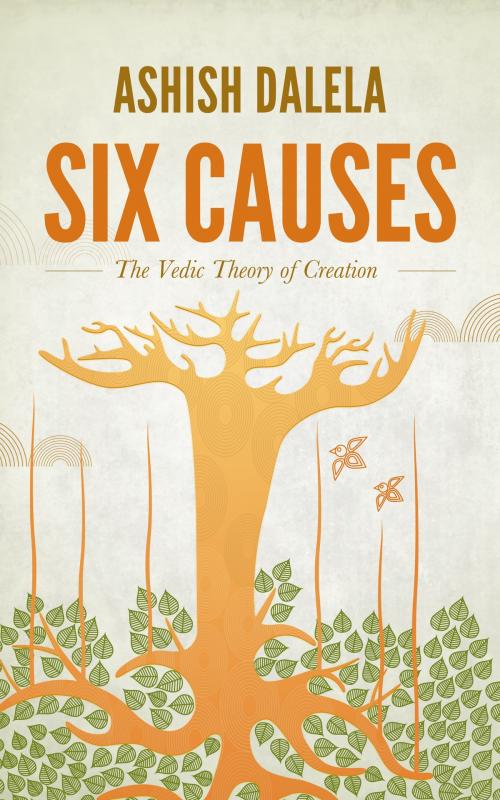Six Causes
The Vedic Theory of Creation
Nonfiction, Religion & Spirituality, Eastern Religions, General Eastern Religions, Hinduism, Philosophy, Eastern| Author: | Ashish Dalela | ISBN: | 9788193052365 |
| Publisher: | Shabda Press | Publication: | November 16, 2014 |
| Imprint: | Language: | English |
| Author: | Ashish Dalela |
| ISBN: | 9788193052365 |
| Publisher: | Shabda Press |
| Publication: | November 16, 2014 |
| Imprint: | |
| Language: | English |
In Vedic philosophy, creation is modeled as the creative activity of consciousness. Just as an artist creates a painting by first thinking about it and then embedding his ideas into matter, so the creator of the universe creates the world of objects by expressing meanings in His consciousness into undifferentiated matter.
CREATION HAS SIX CAUSES
Creation in the Vedic view proceeds from the unconscious, to conscious experience, to material objects. Each of these three features has a subjective and objective aspect, thereby creating the six causes for which the author dedicates a chapter, as follows:
The Personal Cause of Creation—explores the properties of consciousness, its quest for meaning and self-knowledge and how that quest forms the basis for the creation of the universe.
The Efficient Cause of Creation—describes the mechanism by which the quest for meaning gradually becomes thoughts, desires, judgments, plans and actions, thereby creating various experiences.
The Instrumental Cause of Creation—discusses the Vedic view on the senses, mind, intelligence and ego as the instruments that experience meanings, and embed meanings into matter.
The Formal Cause of Creation—describes the nature of meanings and how these meanings are created as subtle information and then embedded into space-time to create differentiated objects.
The Systemic Cause of Creation—explains how information in the mind is transformed into energy which is then represented into matter as sound vibrations denoting meanings.
The Material Cause of Creation—describes how information is encoded as vibrations in space-time, and how modifications of these vibrations create other observable physical properties.
The six causes are prefaced by a chapter discussing basic difficulties in knowing the past, the problem of meaning, how this changes our outlook about space and time, and how the solution requires consciousness to create the fundamental distinctions in terms of which everything is known. In the process, the book touches upon issues of intelligent design, creationism, the creation vs evolution debate and the unique Vedic view on it. The last two chapters treat the nature of God and His power, the nature of free will and how it interacts with matter, which creates karma and leads to repeated births and deaths (also known as reincarnation).
HOW YOU WILL BENEFIT FROM SIX CAUSES
Presented in lay person’s language, and written for those who don’t have any background in Vedic philosophy, Six Causes will allow you to assimilate a profound understanding of matter, conscious experience, the unconscious, God, philosophy of religion, morality, reincarnation, karma and time. In the process, you will also see many common misconceptions about Vedic philosophy such as impersonalism, polytheism and fatalism overturned.
HOW IS THIS BOOK DIFFERENT?
Currently, the majority of the New Age books dealing in Vedic philosophy or Hinduism start from an impersonal interpretation of the Vedic texts. Not only does this negate the personal character of the soul and God but also fails to authentically describe the Vedic view of matter and the mind. While these books do point out deficiencies in modern materialism, they don’t offer a concrete alternative that can be scientifically meaningful.There is no clear explanation of how conscious activity leads to karma and how consciousness itself is covered by the unconscious history of past experiences. This prevents many people from fully grasping the philosophical depth of the Vedas. Six Causes: The Vedic Theory of Creation tries to fill that gap.
In Vedic philosophy, creation is modeled as the creative activity of consciousness. Just as an artist creates a painting by first thinking about it and then embedding his ideas into matter, so the creator of the universe creates the world of objects by expressing meanings in His consciousness into undifferentiated matter.
CREATION HAS SIX CAUSES
Creation in the Vedic view proceeds from the unconscious, to conscious experience, to material objects. Each of these three features has a subjective and objective aspect, thereby creating the six causes for which the author dedicates a chapter, as follows:
The Personal Cause of Creation—explores the properties of consciousness, its quest for meaning and self-knowledge and how that quest forms the basis for the creation of the universe.
The Efficient Cause of Creation—describes the mechanism by which the quest for meaning gradually becomes thoughts, desires, judgments, plans and actions, thereby creating various experiences.
The Instrumental Cause of Creation—discusses the Vedic view on the senses, mind, intelligence and ego as the instruments that experience meanings, and embed meanings into matter.
The Formal Cause of Creation—describes the nature of meanings and how these meanings are created as subtle information and then embedded into space-time to create differentiated objects.
The Systemic Cause of Creation—explains how information in the mind is transformed into energy which is then represented into matter as sound vibrations denoting meanings.
The Material Cause of Creation—describes how information is encoded as vibrations in space-time, and how modifications of these vibrations create other observable physical properties.
The six causes are prefaced by a chapter discussing basic difficulties in knowing the past, the problem of meaning, how this changes our outlook about space and time, and how the solution requires consciousness to create the fundamental distinctions in terms of which everything is known. In the process, the book touches upon issues of intelligent design, creationism, the creation vs evolution debate and the unique Vedic view on it. The last two chapters treat the nature of God and His power, the nature of free will and how it interacts with matter, which creates karma and leads to repeated births and deaths (also known as reincarnation).
HOW YOU WILL BENEFIT FROM SIX CAUSES
Presented in lay person’s language, and written for those who don’t have any background in Vedic philosophy, Six Causes will allow you to assimilate a profound understanding of matter, conscious experience, the unconscious, God, philosophy of religion, morality, reincarnation, karma and time. In the process, you will also see many common misconceptions about Vedic philosophy such as impersonalism, polytheism and fatalism overturned.
HOW IS THIS BOOK DIFFERENT?
Currently, the majority of the New Age books dealing in Vedic philosophy or Hinduism start from an impersonal interpretation of the Vedic texts. Not only does this negate the personal character of the soul and God but also fails to authentically describe the Vedic view of matter and the mind. While these books do point out deficiencies in modern materialism, they don’t offer a concrete alternative that can be scientifically meaningful.There is no clear explanation of how conscious activity leads to karma and how consciousness itself is covered by the unconscious history of past experiences. This prevents many people from fully grasping the philosophical depth of the Vedas. Six Causes: The Vedic Theory of Creation tries to fill that gap.















